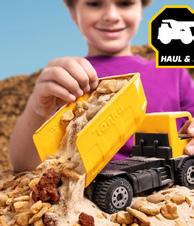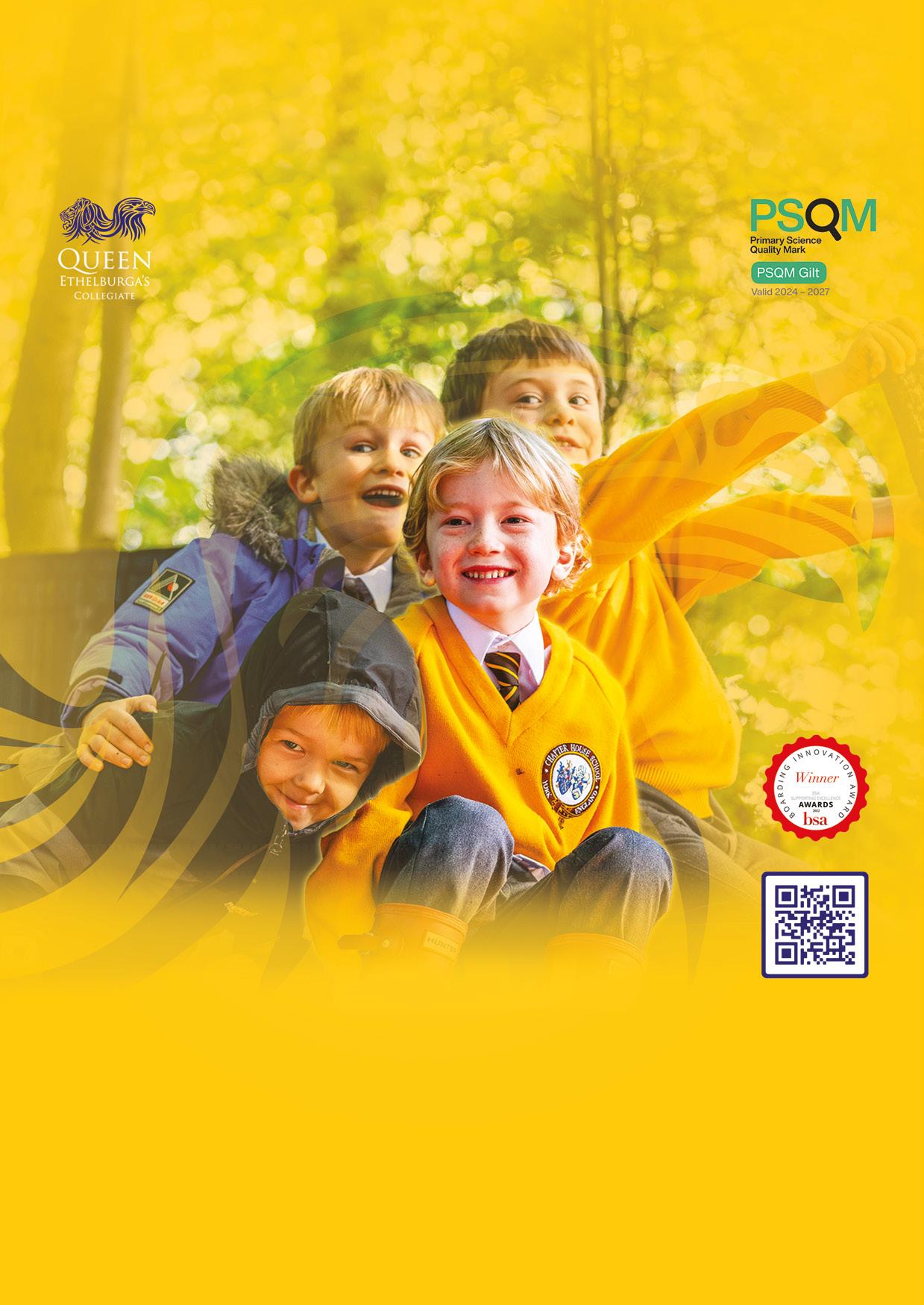
































This issue covers so many great topics as we enter the official leadup to summer!
With the mental health of our children increasingly uppermost in our minds, take a look at eight game-changing products for those who suffer from anxiety.
Are you worried about preserving and protecting childhood innocence? Have you wondered why childhood innocence even matters? Find out in our parenting section.
Check out our education section to find out when you should be applying for your child’s school place and how to get the most from school open days. Also see how to get to grips with phonics if you have a child starting school this year.
Finally, in this issue, we have no less than four giveaways, including a V-Tech Smart Watch and a Smoby Mud Kitchen! Apply inside. By doing so, you’ll also ensure you receive our digital magazine and email newsletter with lots more content and goodies on offer.

January/February issue giveaway winners Congratulations to all our winners. You can find a list at www.bit.ly/JF25recipients



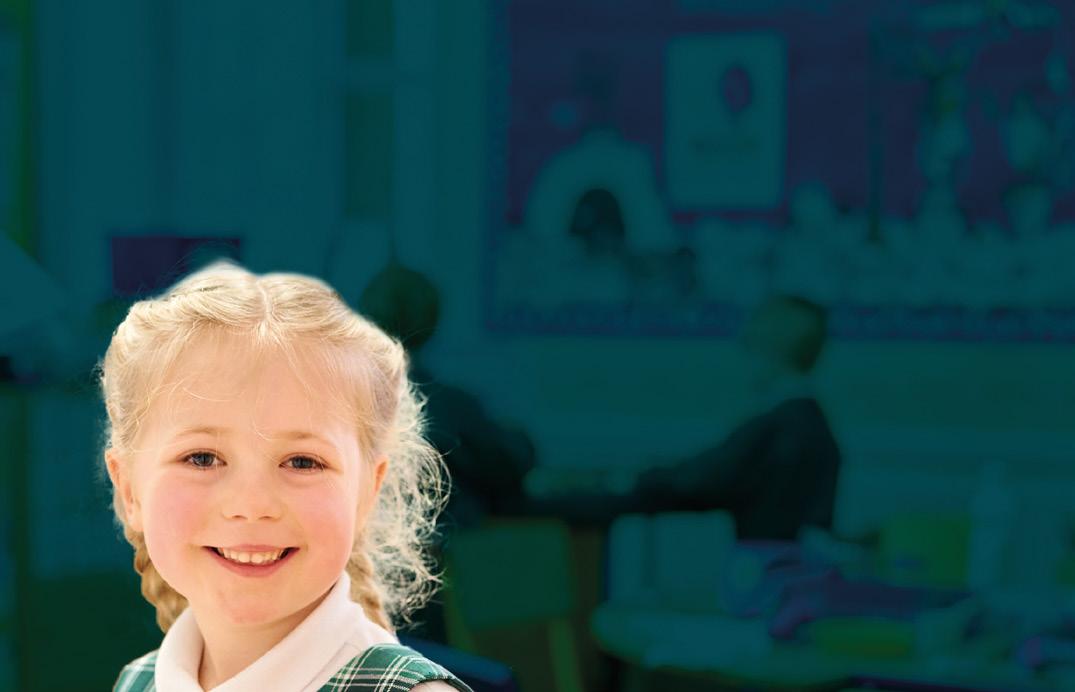

By Melanie Sanderson
Navigating the school admissions process can be a daunting task and it’s never too early to start. For selective independents, especially the most oversubscribed ones, you may need to register up to three years in advance to enter the highly competitive admissions process. The state system equally has rigid deadlines that must be followed to secure a place in your school of choice. Here is a lowdown on all the various processes and key deadlines to help you plan ahead.
For state primary schools, the admissions process begins in the autumn term of the year before your child is due to start school. Attend as many Open Days as you can in the year prior as few state schools offer personal tours. Book in early for these –places fill up fast!
The application deadline is usually the second week of January. Primary school admissions are co-ordinated by your local authority which specifies dates and procedures. After submitting your application through your local authority’s Common Application Form, you can expect to receive your school offer notification in mid-April.
Most secondary school applications are also handled via local authorities, with the application process for Year 7 entry running from 1 September to 31 October in the prior year.
Grammar schools may have additional requirements such as registering for entrance tests during the summer term of Year 5 (your primary or prep school will guide you through the process), with examinations from the September of Year 6. Offer notifications are sent at the beginning of March.

As the name suggests, the main aim of prep schools is to prepare pupils for entry to private secondary schools at either 11 or 13. Traditionally, pre-preps take children from age 3 or 4 and prepare them to move to a prep school at age 7 or 8 (usually school year 3 or 4).
All-through schools are seamlessly linked through pre-prep, prep and senior with generally an easier transition between them, reducing the need for further application processes and assessments.
As always, London dances to its own beat. Whereas in more rural areas, it can be a case of putting little Harry or Harriet’s name down and setting up fee payments, competition for places in London’s top schools can be fierce at every stage, meaning the pressure is on.
Parents who wish to tutor their children ahead of 7+ and 11+ assessments should plan at least a year’s worth of tutoring in advance. Be aware the best tutors also have long waiting lists.

Most independent schools have entry points at 3+, 7+ and 11+. Nursery places are in high demand and usually offered on a firstcome, first-served basis (London schools are the exception with some testing at age 3 and 4+) so it’s crucial you consider your options as soon as possible.
For all independent settings your first task is to register your child. The deadline is usually in the autumn of the year before you would like your child to start. There may be a registration fee and a deposit later on to secure your place. Make sure you understand what the agreement involves and under what circumstances you get your money back.
Plan lots of school visits in the year or two prior to when your child would be due to join the school. Open Day seasons are twice a year – usually September/October and February/March and most independent schools offer smaller or even personal tours too.
Melanie Sanderson is Managing Editor of The Good Schools Guide (www.goodschoolsguide.co.uk), which reviews the key components of hundreds of schools, providing parents with in-depth, unbiased insights.

Do your homework and research all your school options as early as possible.
Attend as many Open Days as you can.
Bear in mind schools and nurseries can change quickly, so while it’s sensible to look at Ofsted reports (or ISI for independent schools), if it is some time since a school has been inspected, the grading may not be representative of where the school is now at.
Make a note of all application and examination deadlines and any other key dates.
Ask your child’s current setting for their advice on next steps –they should be very familiar with the process.
Research tutor options and book in plenty of time.
Prepare for financial outlay on registrations if applying to independent schools.
Good sources of further information include your local authority website, www.gov.co.uk or www.goodschoolsguide. co.uk
By Erin Miller
If your child is in Reception, infant school or starting school this year, you’ve likely encountered the term ‘phonics’ or even the more formal Systematic Synthetic Phonics (SSP). Wondering what it all means? Here’s a brief run-down, plus ideas for how you can support your child to learn it.
In short, phonics (SSP) is the evidence-based method used to teach children to read in the UK. The Education Endowment Foundation reports that ‘phonics approaches have been consistently found to be effective in supporting younger pupils to master the basics of reading, with an average impact of an additional five months’ progress.’ It further notes that research demonstrates that phonics is especially beneficial for ages 4 to 7, as they begin the journey of learning to read.
Phonics highlights the relationship between letters and sounds, allowing children to decode words by sounding them out.
SSP begins by teaching individual letter sounds and gradually moves on to blending sounds to form words. By mastering these phonetic skills, students gain the ability to read fluently and accurately.
The first concepts in phonics to understand are ‘phonemes’ and ‘graphemes.’ A ‘phoneme’ refers to the smallest unit of sound in a language. The word ‘cat’ has three phonemes: /c/, /a/, /t/. A ‘grapheme’ is the written representation of a phoneme: the letter ‘a’ represents the /a/ sound.
At the core of phonics is ‘blending’ and ‘segmenting.’ ‘Blending’ refers to combining individual sounds to form words e.g. /c/, /a/, /t/ into ‘cat.’ ‘Segmenting’ is the process of breaking down words into their individual sounds e.g. ‘cat’ into /c/, /a/, /t/.

Here’s a quick overview of some further concepts in phonics which your child’s teacher will be using.
A blend is a group of two or three vowels or consonants where the vowels or consonants retain their individual sounds.
A consonant blend could be: ‘bl’ as in ‘black’ or ‘gr’ as in ‘green;’ ‘st’ as in ‘star’ or ‘nd’ as in ‘hand.’ A vowel blend could be: ‘ea’ as in ‘bead;’ ‘oa’ as in boat and ‘ee’ as in ‘see’.
A digraph is a combination of two letters that together produce a single sound, different from the individual sounds of the letters.
Consonant digraphs include: ‘ch’ as in ‘chair;’ ‘sh’ as in ‘ship;’ ‘th’ as in ‘this;’ ‘wh’ as in ‘white’ and ‘ph’ as in ‘phone.’ Vowel digraphs include: ‘ai’ as in ‘rain’ and ‘oo’ as in ‘moon.’
Finally, a dipthong is a complex vowel sound that begins with one vowel sound and flows into another within the same syllable. E.g. ‘oi’ as in ‘coin,’ ‘oy’ as in ‘soy’ and ‘ou’ as in ‘house.’

Critics believe that an overemphasis on phonics means that comprehension, vocabulary and other aspects of learning to read are neglected. Although phonics is the mandated system for learning to read in the UK, other approaches do exist. If you’re interested in exploring these, a good starting point is to research the Whole Language approach.
The Whole Language approach is a method of learning to read that emphasises immersing students in rich language environments, prioritising meaning-making and comprehension over precise decoding skills, often encouraging students to ‘guess’ words based on the surrounding text and their prior knowledge.
In my opinion, phonics is an excellent starting point for learning to read but benefits from being combined with elements of other approaches. Be aware that many people (especially online) feel very passionately, both for and against different methods! As ever, all approaches have their pros and cons but remember that phonics is proven to work.
Erin Miller is a teacher with a keen interest in how research can be used in the classroom to improve learning.

If you’re looking to support your child’s phonics learning at home, flashcards are very useful. I have a preference for the physical cards but there are also apps available. Use the flashcards to practise sounding out the letter combinations. For books to support phonics development, the classic Usborne Phonics Readers are a reliable place to start. Keep an eye out for them in your local charity shop or find them in most bookshops or online.
Songs can also be fun and foster phonics development. A quick search on YouTube will yield far more results than you’ll have time to get through!
There are also board games and card games that have been adapted to help support phonics learning. The list of these is extensive, so have a look online and see what appeals most to your family.
Finally, if intervention is required, consider using online phonics programmes. There are many available, some free of charge but it is best to see which is recommended by your child’s school.
By Usha Patel
Is your child upset in the mornings on school days? Are there constant complaints of stomach ache, crying and other bogus illnesses? And, in contrast, are weekends and holidays trouble-free? A trip to the shopping centre, to the Lego shop or popping over to gran’s for a cuppa - nothing is too much bother and there is little or no resistance. You may find that at weekends less sleep is required and to your surprise, your child is up an hour earlier and ready to take on the day.
Then there is your dread on a Sunday night because Monday is looming. It is back to the troubles of the week before.
You may be struggling to understand why your normally chatty and curious child has such an aversion to school. You think about this, worry about it. You may google ‘has my child got dyslexia?’ or ‘what is neuro-divergence?’
Convinced your child has some sort of learning difficulty?
I want to say: please hold on!
I understand you are desperate to help but your child may be too young to be diagnosed (a diagnosis is not possible until age 8 in the UK). The school keeps saying everything is fine, there is loads of time but you are not convinced. That seed is now growing into a small tree and you see a forest on the horizon. You see the Oxbridge option evaporating in front of your eyes and each day compounds your fear.
So what?
Did you know Albert Einstein, Thomas Eddison and Steven Spielberg all had some sort of dyslexia or neurodivergence? What about Jamie Oliver, Tom Cruise, John Lennon and Pablo Picasso? Yep, them too!
As time goes on, the world of work is learning that people who do not fit the ‘typical’ way of thinking are actually the gems they want to employ. In a world of machine learning and artificial intelligence, your child will stand out as having valuable and unique processing skills that mark them out from others in a good way. The sort of special processing skills even the smartest computers will not be able to learn for themselves.

Keep your child happy by celebrating and praising their strengths to help them engage. Everyday activities: sports, baking and art all develop essential skills.
Ensure they can work in sequence, as this impacts learning and daily routines. You may notice struggles with sequencing their thoughts in morning routines or problem-solving. Focus on teaching structured steps early; sustained attention is key. Measure their focus on tasks like games or chores and gradually extend it. Consistency and repetition can create new neural pathways and free up memory capacity.

The best thing you can do is keep your child curious to learn
Learning is not solely about what your child takes in via reading. It can take many different routes; from talking to people to going to museums and seeing things that spark interest, even watching YouTube videos. If your child doesn’t choose reading, it does not mean they do not like stories. Reading to your child or listening to an audio book is just as valid.
Prompt your child to write down their ideas and when you read them, do so without picking out the spelling mistakes. Allow them to use your phone to record their ideas and then you can write them down or they can listen and write them slowly for themselves.
Focus on the value of their ideas and thoughts and overlook the mistakes. By nurturing curiosity, you are allowing your child to flourish. This is not to say you do not help them with their spelling, grammar and punctuation but being too strict about these will damage their self-esteem.
Usha Patel is a Neurocognitive Therapist at Raviv Practice London (www.ravivpracticelondon.co.uk).


Encourage movement - it boosts learning. Young children aren’t built to sit still for long, so integrate activities like playing catch while spelling. Movement sharpens focus and retention.
Understanding working memory is crucial; strong working memory aids reading, maths and daily tasks. Test and strengthen it through memory games, repetition and structured routines.
Everyday skills like setting the table help develop focus and accountability. Small, purposeful actions reinforce cognitive growth, making learning smoother and more enjoyable.
By Ellie Malt
Empathy, hugs and distraction are the first call for any parent trying to calm an anxious child. Over the longer term, cognitive behavioural therapy is one of the most widely recommended therapies. But, if anxiety is a regular feature of your family life then you might also like to explore some of the ever-increasing range of calming products on the market. Here are eight ideas to try.

In 1965, an American scientist with autism, Temple Grandin, invented the hug machine. Inspired by this idea, occupational therapists began using weighted blankets for children with sensory issues. The launch of the gravity blanket saw the first blanket marketed to the general public, as a sleep aid and stress reducer. Sensory Direct (www.sensorydirect.com) offers a wide range of options with differing weights and fabrics to check out.

Purflo’s (www.purflo.com) dream cloud is a night light that combines with soothing sounds and is perfect to help your child fall asleep, featuring ten lullabies, four nature sounds and a heartbeat sound with volume control. It’s also very portable so perfect for keeping bedtime routines consistent on holiday or on sleepovers.
Ellie Malt is a writer and mother of two girls, living in Surrey.

Designed for children ages 5-12, Stix Remotes (www.stixmindfulness.co.uk) are handheld devices that guide kids through screen-free mindfulness exercises. With built-in voice instructions, they offer activities ranging from breathing exercises to movement-based tasks, promoting calmness and focus. Developed in collaboration with psychologists, Stix says the remotes aim to improve emotional regulation.

Although there’s no strong scientific evidence that proves fidget toys work, many people say they find the distraction calming. Fidgets by Amelie (www.fidgets-by-amelie. com) is a UK-based company, specialising in sensory products with a next level design aesthetic. They have a few different toys, each designed for different sensory preferences.

The Lalloo version of a Squeeze Seat offers kids a safe, secluded personal space: great for reducing sensory overload. The design caters to individual preferences, offering options for tight-fitting or oversized seats. It’s just one of several versions for sale at the notfor-profit website Fledglings (www.fledglings.org.uk)
From hoodies to compression vests, there’s a surprising range of weighted clothing to create that portable hug effect. Up until now they’ve been more about their function than fashion, so it’s great to see there’s even a weighted denim jacket available from the UK based company Sensory Direct (www.sensorydirect.com).
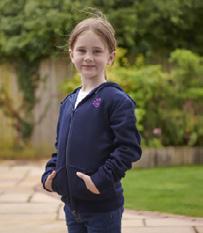

Over-ear defenders and noise cancelling headphones are helpful for kids with sensitive hearing. Ear plugs shaped like a tube are relative newcomers and can be more discrete in noisy places.
Popular with sound engineers and teenagers at concerts, they are also used by those with sensory issues. Manufacturers claim they still allow all noises through but soften sounds to make them more tolerable and reduce cortisol levels. Flare Audio (www.flareaudio.com) make a range called Calmer Kids which fit inside the ear.

They may look like typical cuddly toys but these fluffy buddies can also make cute breathing and gentle snoring sounds, thanks to battery operated speakers fitted into their tummies.
It’s common knowledge that our heart rates and breathing speed up when anxiety strikes. Manufacturers of these breathing toys claim they help children to regulate their own breathing as they hug the toy close and start to match the natural breathing rhythm.
Evora (www.evoraofficial.com) were one of the first to create a breathing Koala which has a soft light up belly, a soothing up and down motion to accompany a breathing sound and a heartbeat.
By Katie Audsley, Family Lawyer – Hartlaw LLP
Divorce is undoubtedly one of life’s most challenging experiences, but the way it’s handled can significantly impact both parties involved, as well as their families. Collaborative divorce has emerged as an alternative approach to traditional, often adversarial, divorce proceedings. It offers a way for couples to separate amicably, with dignity and mutual respect, focusing on cooperation and engagement rather than a positional approach.
What Is Collaborative Divorce?
Collaborative divorce is a legal process in which both parties work together, with the assistance of trained professionals, to reach a fair and mutually beneficial settlement. Instead of battling it out in court, couples and their respective lawyers commit to resolving disputes through open communication, negotiation, and transparency.
In many cases, this process involves a team of professionals: Financial advisors, child specialists, and therapists may join the process to address specific aspects of the divorce, ensuring all parties’ emotional, financial, and support needs are met.
The Key Principles of Collaborative Divorce Voluntary Participation: Both individuals must agree to the collaborative process. It’s built on trust and a willingness to work together.
Commitment to Resolution: All participants, including their lawyers pledge to avoid Court. If the process breaks down, the lawyers involved withdraw, encouraging a focus on collaboration and a unified desire to sort the issues out together. Transparent Communication: Honesty and openness are key.
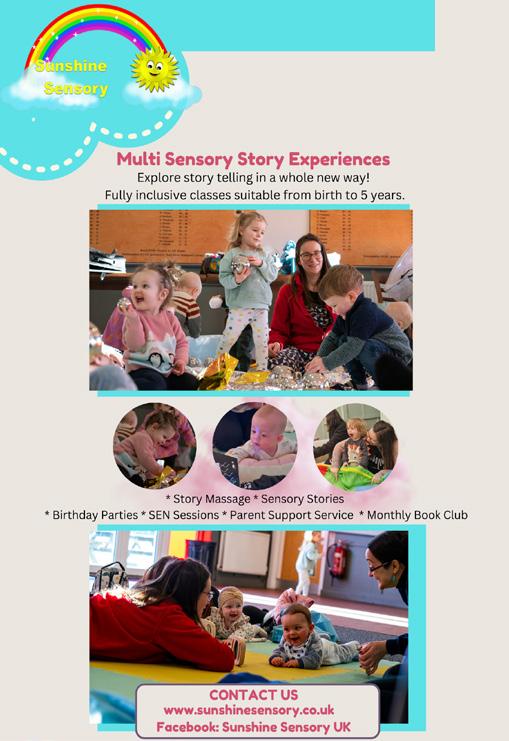
Both parties share relevant information to avoid disputes fuelled by mistrust.
Focus on the Future: Instead of dwelling on past grievances, the process emphasizes creating a solution that works for both parties moving forward.
Benefits of Collaborative Divorce
• Protecting Relationships: Especially important for couples with children, collaborative divorce helps preserve a positive co-parenting dynamic
• Cost-Effective: Avoiding court battles often translates to lower legal fees.
• Time-Saving: Streamlined negotiations tend to be quicker than drawn-out court processes.
• Less Stressful: The cooperative nature reduces emotional strain for both parties and their families.
• Customized Solutions: Couples can craft agreements tailored to their unique needs and circumstances with creative solutions not available to the court.
Collaborative divorce works best when both parties are willing to engage in respectful dialogue and compromise. It’s particularly advantageous for couples who wish to maintain a civil relationship post-divorce, such as co-parents or those with shared business interests. However, in cases involving domestic violence, significant power imbalances, or unwillingness to cooperate, this process may not be suitable.
While no divorce is easy, the collaborative process offers a path of mutual respect and understanding. It allows couples to move forward without the bitterness that can accompany adversarial proceedings. By prioritizing the needs of all involved, especially children, collaborative divorce transforms what could be a painful ending into a more constructive transition. The right support, mindset, and professional team can make all the difference.
Here at Hartlaw all of our family lawyers are collaboratively trained and can explain the process further and help you determine if this is the right approach, or guide you to the approach that best suits your family’s needs.
If you require any advice or assistance in relation to any aspect of family law, please do not hesitate to contact us. Dianne, Kate or Katie in our family team offer a free initial consultation. Please do contact us by calling 01937 547000 or by emailing info@hartlaw.co.uk







Post-Covid, speech and language development has become a key concern for parents, especially as NHS waiting times for Speech and Language Therapy (SLT) remain long. A June 2024 report revealed 22,952 children were on NHS SLT waiting lists for up to a year.
In response, Chapter House School and Queen’s Kindergarten appointed its own SLT, Sarah Semple, who works with children in one-to-one and group sessions. As Sarah reflects, “Every child is assessed upon joining the school with Individual Learning Plans put in place for those with support needs right through to those who are gifted. In a school environment, I can work closely with teachers and parents to help children meet their full potential, ensuring they receive the necessary support as soon as the need is identified, minimising any impact on their confidence, social interactions, or academic performance. It’s rewarding to identify needs early and support children throughout their educational journey.”
qe.org/chapter-house
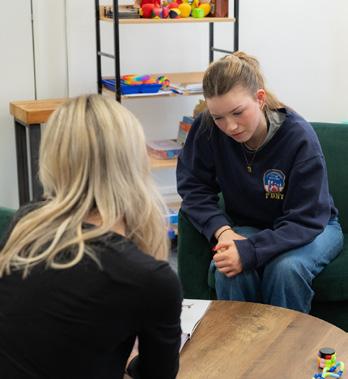
When autism first began to be studied, people thought it only affected boys because the studies only looked at one presentation of autism. We now know that autism is a spectrum.
More people are being diagnosed now, because we understand autism better and we’re no longer looking for just one presentation of autism.
More girls, women, transgender, and non-binary people are being diagnosed. This bias in the original studies affects different ethnicities too, because the boys they studied were mostly white.
Autism doesn’t only affect boys, it just might not be as obvious in other genders. Dr Stephen Shore once said, “When you meet one person with Autism, you’ve met one person with Autism”.
At Evolve Psychology Services, founded by Dr Laura Powling, a clinical psychologist, we offer autism (and ADHD) assessments for children, and adults.
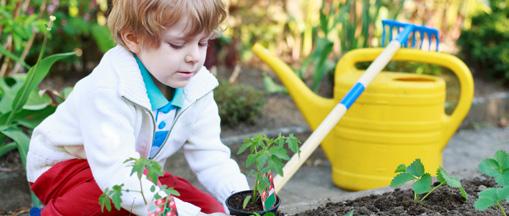
This summer, why not get involved in National Children’s Gardening week?
Taking place from 24 May to 1 June, pretty much throughout the UK, children can plant all their favourite plants with less fear of weather damage or the need for complicated protective growing.
As well as simply good outdoor fun, gardening has been shown to have many benefits to health and wellbeing including being more physically active and feeling happier and more connected with the natural world.
There are many ways to get involved with National Children’s Gardening Week from DIY activities at home, to attending an event at a local garden centre.
More info: www.childrensgardeningweek.co.uk
Evolve offer an expert service with care, attention and empathy at its heart. We now have clinics in Harrogate, Huddersfield, Norwich, Exeter and Dublin with a new clinic opening in the North East soon.
If you’d like to know more please visit www.evolvepsychology.com
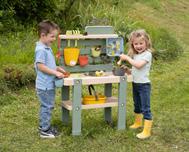


Sewerby near Bridlington Bridlington Kite Festival
Danby Lodge National Park Centre
Animals! Theatre performance
The animals are gathering. But one species hasn’t turned up, and it’s the species which has been causing all the trouble. Something’s got to be done, and whatever it is, it’s going to be wild! Fun, interactive and featuring original songs, Animals! An empowering and uplifting performance about animals, humans and nature. gate.
Malton Malton Food Lovers
Festival
Discover Buckets of Fun
Expect artisan stalls, delicious street food, talks, tastings, celebrity chefs, demos, festival bar, live music & much, much more!
From flying frogs to sky-high snakes and leaping lizards to daredevil dragons, scores of exotic inflatables will add a splash of colour to the cliff tops above the popular seaside resort of Bridlington.
Thornton Hall Country Park Pony Weekend
If you and your little one(s) love all things ponies then Thornton Hall Country Park has the ultimate family day out for your family this May.
Kiplin Hall & Gardens Buckets of Fun
Discover Buckets of Fun activities hiding in the grounds of Kiplin this May Half Term, full of things to do in Yorkshire! Play games, explore trails, learn, and laugh as a family in the fresh air.
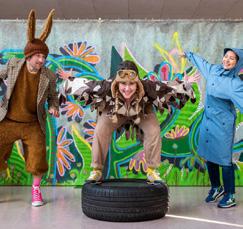
Sutton Bank National Park Centre
Animals! Theatre performance

Lotherton Hall
The animals are gathering. But one species hasn’t turned up, and it’s the species which has been causing all the trouble. Something’s got to be done, and whatever it is, it’s going to be wild! Fun, interactive and featuring original songs, Animals! An empowering and uplifting performance about animals, humans and nature.
Thornton Hall Country Park
Dino Live
Step into the gardens and discover a world of giant garden games, perfect for testing your skills and having a great time with friends and family. From oversized chess to jumbo Jenga, there’s a game for everyone to enjoy! All listings are correct at the time of publication. Please check with the
Love your Zoo week Follow the ‘amazing animals’ trail, hop on board the tractor trailer for a deer park tour, get crafty in the House and find out more about the wildlife in our zoo. Look out for a programme of animal stories from around the world in the storytelling tent.
Temple Newsam
Find your Happy! Temple Newsam are bringing the joys of spring indoors and invites you to take part in activities that will make you feel good and put a smile on your face. With crafts, activities, and trails for the whole family to enjoy.
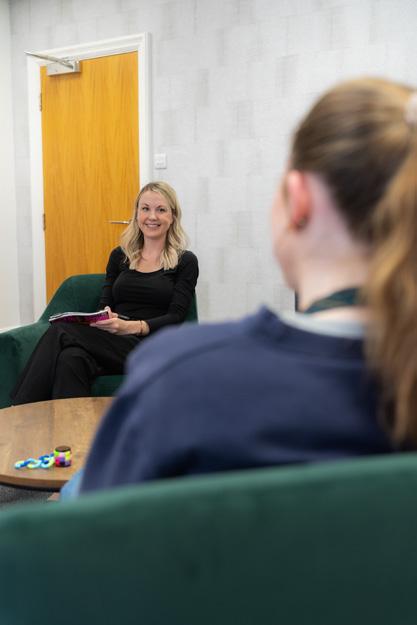

If you decide to explore a diagnosis of ADHD or autism for yourself or for your child, you are on a new journey and will want an expert and friendly partner alongside you Evolve has various locations including Harrogate and Huddersfield, where we ' ve hand-picked an incredible team to make sure you and your child feel seen, heard and taken care of through the neurodevelopmental assessment We are committed to making every appointment as comfortable as possible
We offer ADHD and autism assessments for children young people and adults and are proud to be recognised as an approved provider by NHS England through the Right to Choose route This means the assessment is funded by the NHS We also offer assessments through private appointments
Evolve was founded by Dr Laura Powling, clinical psychologist, to offer an expert service with care attention and empathy at its heart Our mission is to make a difference by supporting people through their journey in assessment and empowering them to move forward
Embark on a prehistoric adventure like no other! Life like dinosaurs and a live action stage show with our very own park rangers. Fullon fun for the whole family.
Eden Camp
May Half Term Fun!
Embark on a family-friendly adventure to Eden Camp Modern History Museum this May half term, where you and your family will journey back in time to explore the sights, sounds, and even the smells of what life was like on both the Home Front and Front Line during the Second World War.
RHS Garden Harlow Carr
The Great Garden Gameathon

The Web Adventure Park May Half Term Fun! Join Dazzling Darren for foam parties, magic and entertainment this May half term at The Web Adventure Park! Plus enjoy unlimited fairground rides, the Lightyear Lazer zone, animal encounters and so much more, all included in one ticket!
Abbey May half term Fun & Games
Challenge your family and friends to giant lawn games, bounce around on space hoppers, and splash about in the sand and water pits. With plenty of hands-on activities in the beautiful grounds of Whitby Abbey, it’s the perfect way to enjoy fresh air and family fun!
Nunnington Hall Fun at the Fete
This May half term, be transported to the fun of a village fete with themed games throughout the gardens. Have a go at hook-aduck and test your aim at the coconut shy in this one-week extravaganza.
Danby Lodge National Park Centre
The Wild West Quest
Join the BioBlitz, family friendly surveys, to help the wildlife experts learn more about the plants and creatures that live at the National Park Centres.
Sutton Bank National Park Centre
The Wild West Quest
Join the BioBlitz, family friendly surveys, to help the wildlife experts learn more about the plants and creatures that live at the National Park Centres.

Thornton Hall Country Park
Dino Live
Embark on a prehistoric adventure like no other! Life like dinosaurs and a live action stage show with our very own park rangers. Fullon fun for the whole family.
Lotherton Hall
Volsung Vikings
Dust off your chainmail and shield… the Volsung Vikings will be invading the grounds of Lotherton! Join them for a weekend of Vikingthemed activities – with living encampments, thrilling battle performances, kids’ activities and lots of fun. Dress up and get involved, while bringing history to life.

With over 1,600 exhibitors and a host of entertainment, crafts, food & drink Tractor Fest is a great day out for anyone, of any age
Great Knaresborough Bed Race
Bed Racing is a muchloved annual pastime in Knaresborough, combining as it does a gruelling athletic contest with a spectacular fancy dress parade of decorated beds and runners. This year’s theme is ‘TV Adverts!’.
Bolton Castle Living History Medieval Weekend
Head to Bolton Castle and find out what life would have been like for the people who lived and worked in the castle, many of whom followed their lord to war in a turbulent period of our history.

Grand Opera House, York
The dinosaur that Pooped Adapted from the number 1 best-selling books by Tom Fletcher and Dougie Poynter, the whole family will have a poopy good time enjoying a brand new story for the stage. Featuring new songs by Tom and Dougie, a lot of laughs and a whole lot of poo!
The Stray, Harrogate Harrogate Food & Drink Festival
Live chef demo’s, Artisan Market, Live Music, Free Kids activities, Fun Fair and so much more.
Various locations across York York Festival of Ideas 2025 York Festival of Ideas promises to spark children’s imaginations with a wide variety of mostly FREE family events and activities.

Don’t miss Michael Morpurgo Celebration Day, featuring two fabulous free events with the acclaimed children’s author – an evening of poetry and music at My Heart was a Tree: The concert, and a live online event, Cobweb, for schools and home educator groups.
You can also enjoy some space-themed fun, find out what it’s like to be an archaeologist at an indoor dig or take part in an interactive concert. Why not step into nature on a guided walk, explore a world built by fairies, search for medieval masons’ marks, or learn about D-Day and view Second World War vehicles?
Visit the Festival website to find out about Discovery Zone, the Festival Fringe Family Fun Afternoon and other free interactive events.

By Andrew Campbell
Summer holiday camps, courses and workshops are not only an ideal way to fill in childcare gaps during the long summer holiday but also offer the opportunity for your child to discover a new hobby or take their existing passion to a new level.
Multi-activity day camps. These camps offer a diverse daily schedule of sports and creative activities, with multiple sessions lasting one hour to ninety minutes. Ideal for kids with varied interests, they generally feature sports, arts and craft, outdoor exploration and games. Camps offer flexible booking options, including single days, half days, full weeks, extended hours and multi-week discounts
Sport/single activity camps or workshops. Sport and single activity camps or workshops are perfect for kids keen to focus on specific interests, including sports, creative arts, performing arts or STEM. These programmes, running from a day to two weeks with sessions lasting two to five hours a day, often wrap up with performances, games or project showcases. They cater both to experienced children seeking expert coaching and newcomers curious about trying something different, offering immersive experiences to enhance skills, boost confidence and ignite enthusiasm.
These camps or workshops offer expert guidance for passionate children and valuable insights for those exploring new interests. They foster personal growth, help children meet like-minded peers and provide enriching holiday experiences.
Out of the ordinary. Traditionally themed camps or workshops are great but there’s a world of unique activities waiting to spark curiosity and creativity too!
How about a circus skills workshop? Children can learn juggling, tightrope walking and acrobatics in a fun and energetic environment. It’s not only entertaining but also improves balance, co-ordination and confidence. For something out of this world, sign your child up for a space and astronomy camp. Through telescope sessions and hands-on experiments, children

Number Train is a fun and interactive introduction to maths for preschool children designed and delivered by an experienced primary maths specialist. With a different theme each week, sessions keep your child engaged with games, action songs, arts and craft.
Call 07852 989523 numbertrain@hotmail.com

Classes include singing and drama in a fun and exciting environment in Church Fenton. Performance work is showcased each term, along with a full musical once a year, acting exams, competitions and performances at local events are part of our curriculum. In January we are also excited to be starting Screen Acting Classes working towards exams in the area. perfectpitchstars.com

can discover the wonders of space while developing a passion for science. Your budding chef could even take their culinary prowess to the next level at the surprising range of cooking camps available across the country.
Why not consider a residential camp to develop independence, social skills and confidence? Short-term stay options, such as Tryout Camp (www.summercampstrust.org/tryoutcamps-2025), operated by the Summer Camps Trust in Worcestershire, make it more manageable and affordable for both parent and child. Or the entire family can experience camp life at Summer Camp, a series of nature-based micro-festivals organised by The Good Life Society (www.thegoodlifesociety. co.uk) at Flintshire’s Hawarden Estate.

A unique and enriching experience that engages all your little ones senses while promoting relaxation, enhancing well-being, and creating memorable moments. Visit the website to discover how you can begin your little one’s sensory journey today!

Classes for babies and toddlers from 6 weeks old. Your little ones will have a great workout, singing and playing through our structured awards programme to build water confidence and progress to a confident swimmer.
sunshinesensory.co.uk
info@babyswimmers.co.uk
“Number Train has set my child up with such a positive outlook and ‘can do’ attitude
Number Train first arose when Number Train founder, and former primary teacher, Annette, noticed that, whilst many pre-school classes were available, and some engaged with topics like phonics, there was nothing out there about numbers! Maths is a compulsory subject throughout the majority of our education system, and because it begins at such an early age, the challenges some children face in numeracy at the very start, can go on to develop into negative feelings and concerns about maths that continue through their school career.
Well, Number Train certainly puts a stop to that! Through dynamic, fun, creative sessions, children are encouraged to explore numeracy through play and a wide range of activities. Singing, dancing, art, games and stories (to name a few) all contribute to making Number Train sessions an engaging and inspiring way to introduce your children to maths. Not only that, but given that Number Train was carefully designed by former primary school teachers, the classes familiarise the children with the terminology and methods they will encounter at school, as well as incorporating other elements of school readiness, like completing tasks independently, following instructions, and working with others.
“I could see after just a few sessions that my son had become much more interested in numbers outside the class, and the skills that he built up at Number Train have helped him fit into the school routine and given him confidence.”
The success of Number Train speaks for itself. From Annette initially teaching a few sessions a week in Horsforth, in just a few years, the high demand for Number Train has meant it has expanded to Harrogate, Wetherby, Otley and Ilkley with a team of enthusiastic Train Drivers on board.
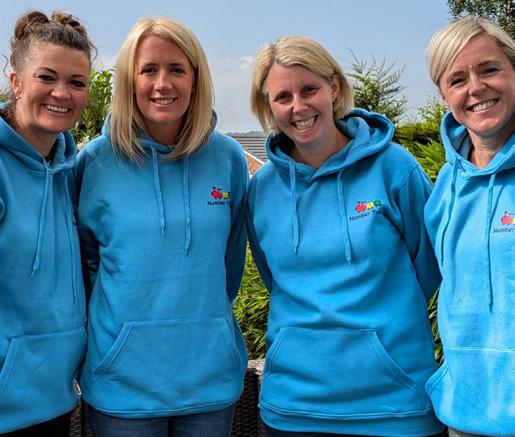
This year, for the first time, Number Train will begin classes in York and Bradford, allowing even more children to gain confidence, become enthusiastic learners, and to approach maths with a smile on their face.
To find out more about Number Train and to find your nearest class please visit www.numbertrain.co.uk











If your child is reluctant to enrol in a summer camp, course or workshop, it’s important to approach the situation with patience and understanding.
Start by listening. Understanding what makes them anxious, whether it’s meeting new people, fear of failure or unfamiliar settings, can help you address those fears effectively.
Offer choices. Let them explore activities that match their interests. Whether it’s football, painting or drama, feeling in control can reduce anxiety and spark excitement.
Take it slowly. Talk to the camp provider in question about whether your child can observe activities they are not sure about, before deciding whether or not to join in.

Model confidence. Your own attitude can play a big role. Show enthusiasm and positivity about the activity. Children often pick up on their parents’ emotions and a confident approach can help them feel more secure.
Celebrate effort, not outcomes. Offer praise for participating, regardless of results. Building their confidence step by step will encourage them to keep trying.
By Catherine Loble and Lisa Wander
Childhood innocence is characterised by an unfiltered view of the world, an ability to find joy in simple things and a natural trust in the goodness around them. This untainted perspective is not only heartwarming, it is essential for a child’s development.
However, many children will experience sadness, grief, fear and disappointment, some earlier and in greater measure than others and it cannot always be avoided. The global pandemic was a compelling reminder that no child is exempt from difficult emotions and experiences. So how can we preserve childhood innocence in our unfiltered world?
Spanning birth to adolescence, childhood is characterised by growth, discovery, learning and the development of physical, emotional, social and intellectual abilities. This fleeting, magical phase of life is brimming with curiosity, innocence and joy, a time when imagination knows no bounds. Yet, in today’s fast-paced, digital-first world, preserving and fully enjoying childhood has become increasingly challenging.
We are all so busy and our children’s lives reflect that, with long school days, extracurricular activities, playdates and a constant stream of entertainment and stimulation. Childhood flashes by and before we know it, they are teenagers immersed in the world of social media, their innocence long gone.
Modern day life ‘dictates’ that we need to provide our children with constant stimulation, structured activities, the latest toys to enhance development and even start them at a nursery as babies in order that they develop social skills. Consequently, from a very young age, our children are in a relentless routine, within which the essence of childhood is lost.
The good news is that there are many ways to step off this treadmill and allow our children to thrive and enjoy their childhood without the continuous tedium of busy schedules.
Whilst some extracurricular activities are fun and beneficial, be mindful of overscheduling. Choose one or two which your child enjoys and strike a balance between structured activities and free time. Childhood is the perfect opportunity

The simplicity of childhood innocence allows children to experience life’s joys without the weight of adult worries. Innocence allows children to develop trust and form healthy emotional bonds.
An innocent mind is a creative mind. Seeing the world with fresh eyes fuels imagination and creativity, essential traits for problem solving and innovation.
Innocence is closely linked with children’s sense of right and wrong. Protecting their innocence helps in developing a strong moral foundation, guiding them to become kind and ethical adults.

to cultivate curiosity through unstructured play which in turn fosters creativity, problem-solving and emotional resilience, for example building forts, role play, exploring nature and outdoor adventures.
Protect your child’s innocence while teaching resilience: children are born innocent and with that innocence comes trust. Whilst we should strive to shield our children from unnecessary stress or the severity of the grim news which dominates our world, it’s equally important to equip them with age–appropriate tools to navigate challenges and deal with disappointment and the world around them.
By monitoring and filtering their media exposure, we can create and foster a safe environment where our children feel comfortable to talk.
Children often emulate adults so where possible model enthusiasm for life to inspire your children to embrace it with joy and curiosity. Be mindful of how you talk about the world around you and manage your own emotions and fears without amplifying your children’s worries.
Preserving and enjoying childhood is as much about us as it is about children themselves. By being present, creating nurturing environments and encouraging exploration, we can help children savour and enjoy their youth while still preparing them for their future adult life. These formative years are a gift to be cherished, protected and celebrated.
Lisa and Catherine are co-founders of Emparenting (www.emparenting.co.uk), supporting children, parents and families with the insights, skills and tools needed to nurture the development and well-being of the next generation.

Appreciate, value, actively listen and participate in your child’s interests. Simplify explanations - provide simple, truthful answers to questions. Avoid overloading with too much information and keep adult topics for adults.
Weave and create special memories of time spent together. Step into nature and explore the world together.
Maintain a joyful environment. Laugh together and share spontaneous fun. It feels great and strengthens bonds. Ensure limited, age-appropriate and monitored screentime.
Constipation is common at all ages and can be treated at home by putting some simple changes in place for your toddler.
What does constipation look like in a child?
Pooing less than three times a week. When they do go, their poos may be large, hard or lumpy and harder for them to push out.
Your child may may avoid going to the toilet, be tired and lack energy.
Your child may soil his/her clothes. This happens when there is a large amount of hard poo trapped at the end of their bowel. Fresh poo leaks out around it.
If your child is toilet trained but soiling regularly, see your GP for an examination.
Causes of constipation
Constipation in toddlers can have many causes. Sometimes there’s no obvious reason. It could be not drinking enough water; not enough fruit and vegetables; change in routine (starting nursery); potty training or resistance to it or fear of the toilet.
What to do
Of key importance for healthy bowels is to drink enough. Six to eight cups of water, well diluted fruit juice or sugar-free squash a day is recommended. Avoid drinks containing caffeine and fizzy drinks.
A balanced diet including fruit, vegetables and cereals, helps keep the bowel healthy. These foods keep fluid in the poo so it’s easier to pass.

Encourage your child to sit on the toilet fully clothed with the lid down for brief periods to help them see that the toilet is a safe place.
Give lots of praise and encouragement. Once they’re okay with this, repeat with the lid up, then take off the outer layer of their bottom clothing, eventually removing pants. Don’t worry if they don’t poo – the aim is to get them to feel happy on the toilet.
If they’re still in nappies, start by loosening the tabs, before progressing to removing the nappy. Letting the nappy lie in the toilet bowl can help (remembering to remove it before flushing), as can putting toilet paper in the bowl first to reduce any splash.
Provide a step or stool to help your child get onto the toilet and have a book or toy for them to play with. Some children benefit from having something weighted on their laps when on the toilet, such as a hot water bottle or folded blanket.

Keeping active helps get the bowel moving. Running around at the park, playing in the garden or around the house can all help!
Having a good toilet routine is really helpful. Get your child to sit on the toilet or potty around twenty to thirty minutes after eating. Make it relaxed and fun and praise them for sitting there, whether they poo or not.
A good sitting position on the toilet is important. Support your child’s feet on a box or stool so their knees are above their hips. To push out a poo, we need to be relaxed, so play with your child to help them. Laughing and blowing bubbles help them use the muscles that push out the poo.
Finally, ask your child if they feel worried about using the toilet; it might be that they don’t like the toilets they use regularly, e.g. at nursery or that something has changed which is upsetting them.
Remember that your child isn’t constipated or soiling deliberately so stay calm, relaxed and reassuring. Your Health Visitor can give you additional advice and guidance.
For more information, visit www.healthforunder5s.co.uk
Ages 3+
